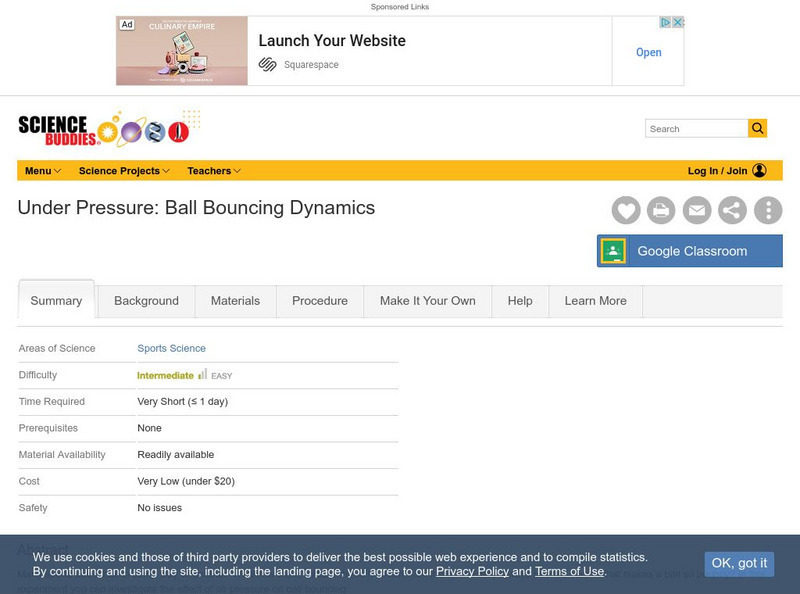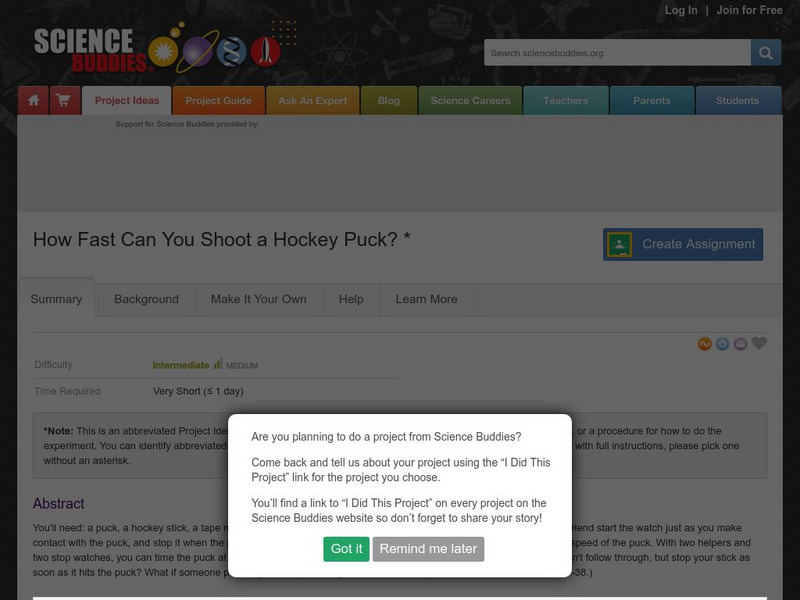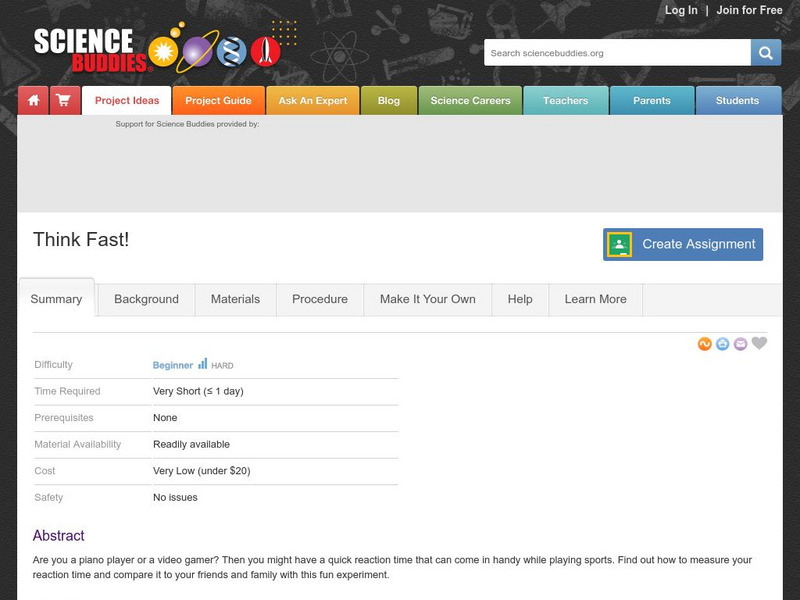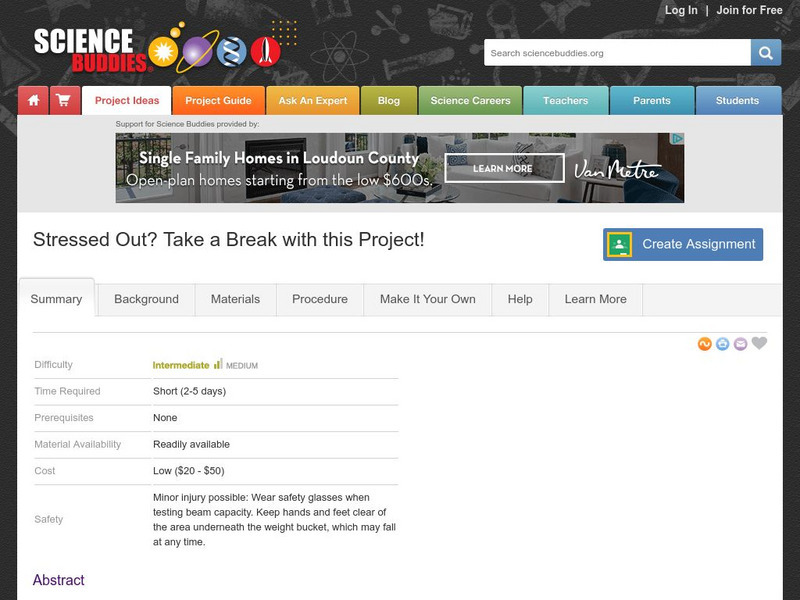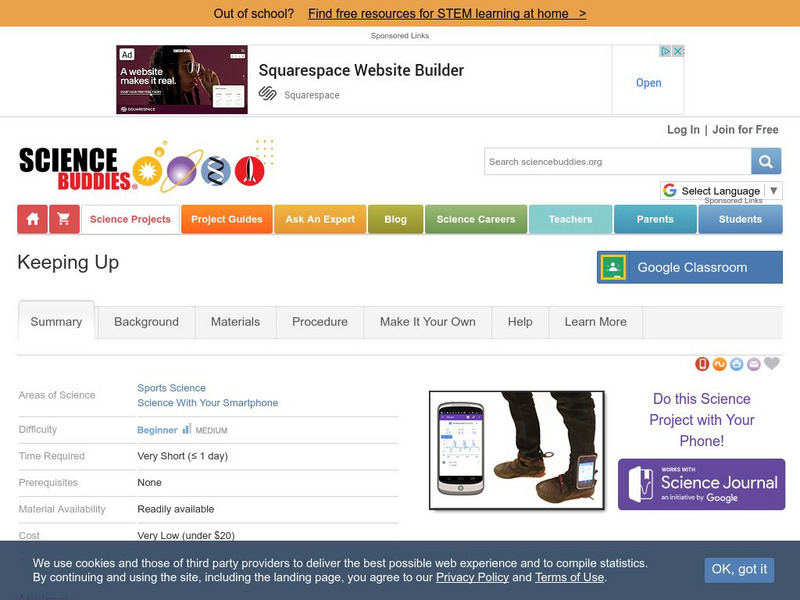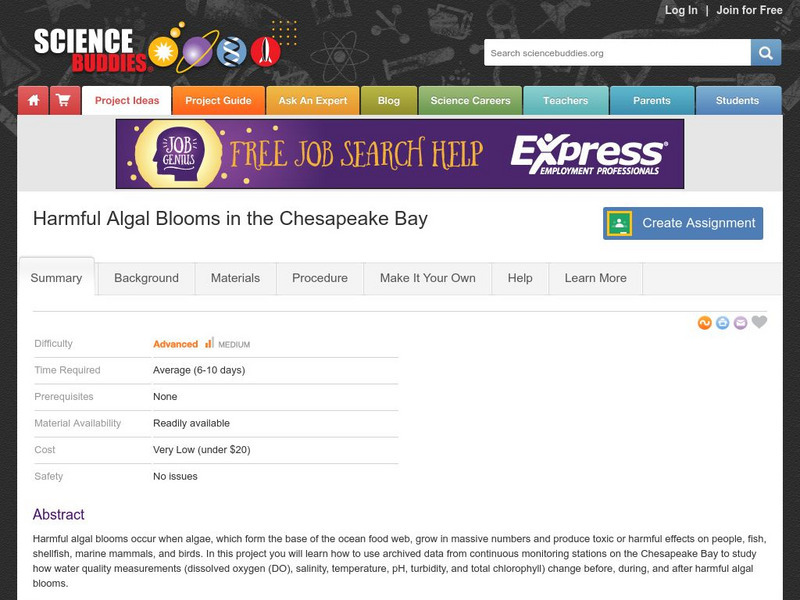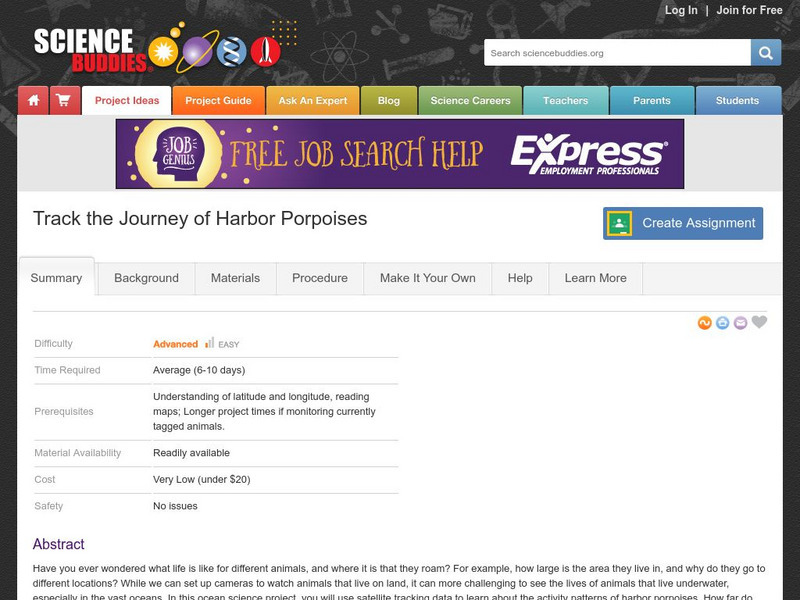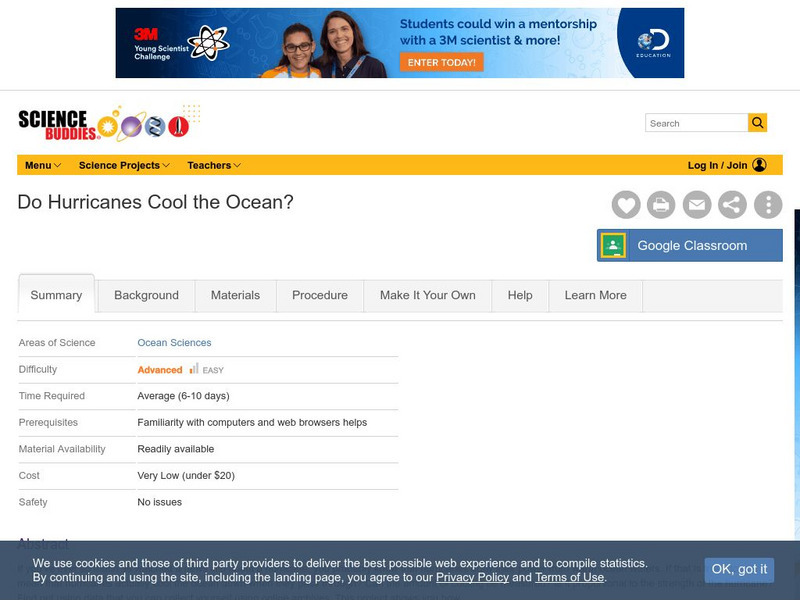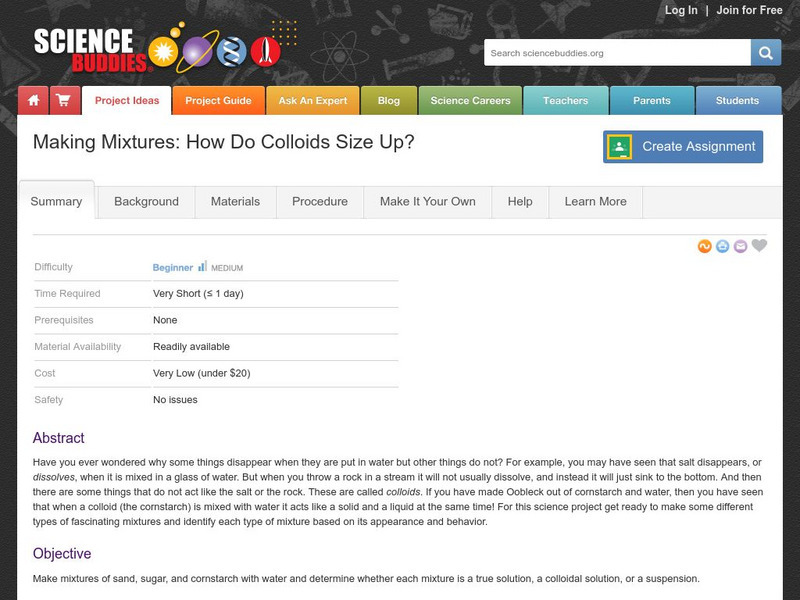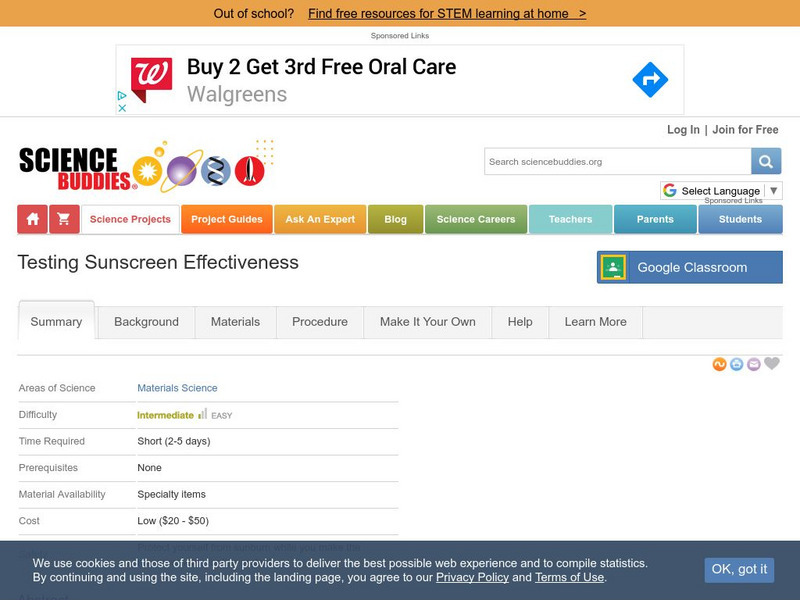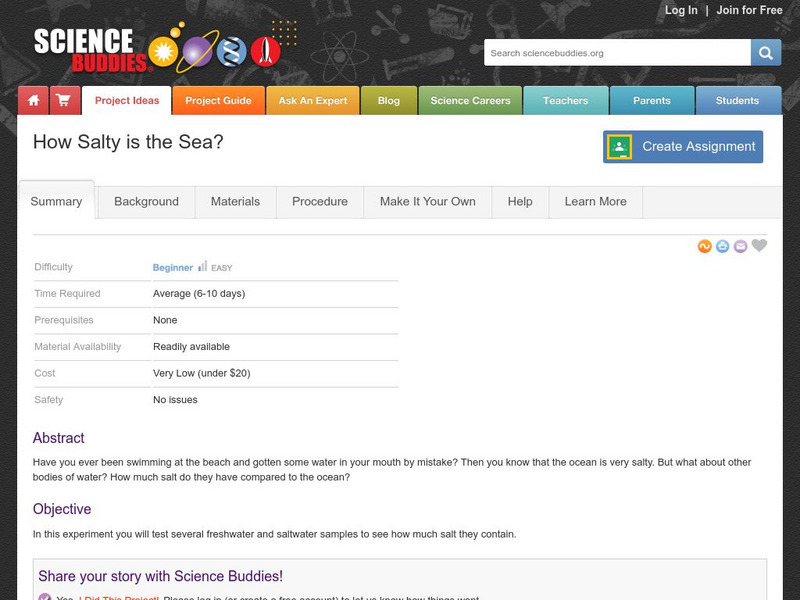Science Buddies
Science Buddies: Does Temperature Affect the Rate of Butterfly Development?
This is an interesting experiment for an Investigator who is 1) curious about insect metamorphosis and 2) patient. You'll need to set up different controlled environments for the chrysalides, and then check on them regularly as you wait...
Science Buddies
Science Buddies: Accept a Design Trade Off Challenge Science Projects
Build a device to accomplish a fun task. Accept a design trade-off challenge of using only a set amount of simple materials, as if you were stuck on a desert island, to make your device work.
Science Buddies
Science Buddies: Tee Time: How Fast Is Your Golf Swing?
Determine how golf club head velocity affects shot distance. Make your next trip to the driving range educational by conducting this experiment.
Science Buddies
Science Buddies: Do Dilutions of Disinfectants Affect Bacterial Resistance?
This is a project that illustrates the process of natural selection in action. You'll need access to a laboratory for working with the bacterial cultures used in this project.
Science Buddies
Science Buddies: Under Pressure: Ball Bouncing Dynamics
Many sports use a ball in some way or another. We throw them, dribble them, hit them, kick them, and they always bounce back. What makes a ball so bouncy? In this experiment you can investigate the effect of air pressure on ball bouncing.
Science Buddies
Science Buddies: Does a Cell Phone Conversation Affect Reaction Time?
Does talking on a cell phone make one a more dangerous driver? Here is an experiment you can do to investigate whether reaction time is adversely affected by a simultaneous phone conversation.
Science Buddies
Science Buddies: How Fast Can You Shoot a Hockey Puck?
In this project, you'll need: a puck, a hockey stick, a tape measure, at least one helper with a stopwatch and an empty rink. Have your friend start the watch just as you make contact with the puck, and stop it when the puck hits the...
Science Buddies
Science Buddies: Think Fast!
Are you a piano player or a video gamer? Then you might have a quick reaction time that can come in handy while playing sports. Find out how to measure your reaction time and compare it to your friends and family with this fun experiment.
Science Buddies
Science Buddies: Are Laminates Stronger?
If you love to hit the half pipe with your snowboard or skateboard, then you have tested the strength and durability of laminates. Laminates are sandwiches of different materials that are glued together in layers to give strength and...
Science Buddies
Science Buddies: Stressed Out? Take a Break With This Project!
Is an I-beam as strong as a solid beam of the same size? What if you include weight in the comparison: which beam has the greater strength-to-weight ratio? Would an I-beam be stronger than a solid rectangular beam of the same weight?...
Science Buddies
Science Buddies: Strength in Numbers?
Ever try to tear a telephone book in half? Even though you can easily rip one or a few pages to shreds, the entire phone book has strength in numbers and holds together. This project is an introduction to measuring and comparing the...
Science Buddies
Science Buddies: Keeping Up
Do you ever feel like you need to walk faster than your parents just to keep up with them? This is because of the difference in leg length between you and your parents. In this experiment you will test if the height of a person is...
Science Buddies
Science Buddies: Harmful Algal Blooms in the Chesapeake Bay
Harmful algal blooms occur when algae, which form the base of the ocean food web, grow in massive numbers and produce toxic or harmful effects on people, fish, shellfish, marine mammals, and birds. In this project you will learn how to...
Science Buddies
Science Buddies: Can Water Float on Water?
Of course it can, you say: ice is water and ice floats. And you're right. But we're talking about water in the liquid phase Can liquid water float on water? The goal of this project is to investigate what happens to layers of water with...
Science Buddies
Science Buddies: Harbor Porpoise Movement
In this project you can use archived satellite tracking data to learn about activity patterns of harbor porpoises. How far do they travel? Can you find patterns in the routes individual animals take? Can you correlate their route with...
Science Buddies
Science Buddies: Do Warmer Seas Make Stronger Hurricanes?
We've all heard that hurricanes draw their immense power from warm ocean waters. Of course, many factors contribute to the formation and growth of a hurricane, but can we expect to find that the warmer the water, the stronger the...
Science Buddies
Science Buddies: Do Hurricanes Cool the Ocean?
If you've ever so much as watched a news clip about a hurricane, you probably know that hurricanes draw their power from warm ocean waters. If that is true, does it mean that hurricanes actually cool the ocean down when they pass...
Science Buddies
Science Buddies: Heart Health: How Does Heart Rate Change With Exercise?
Your heart starts beating before you are born and keeps right on going through your whole life. Over an average lifetime, the human heart beats more than 2.5 billion times. Keeping your heart healthy means eating right, not smoking, and...
Science Buddies
Science Buddies: Hurricanes and Climate
The past few years have histories of extremely powerful and dangerous storms. These storms have also increased in frequency. To investigate potential effects of climate on hurricane number and strength, this project will focus on the...
Science Buddies
Science Buddies: Getting Critical Over Colloids
What is a colloid? If you have made Oobleck out of corn starch and water, then you know that a colloid is a mixture that acts like a solid and a liquid at the same time. This activity helps you determine the critical factors that...
Science Buddies
Science Buddies: Timing the Tides
Have you ever been to a tide pool during low tide? Some intertidal animals in the low tide zone are left in a tiny pool of water when the tides go out. Other intertidal animals that live in high tide zones may be left to dry out during...
Science Buddies
Science Buddies: Testing Sunscreen Effectiveness
The goal of this project is to measure the effectiveness of different sunscreen products for blocking ultraviolet-A (UVB) and ultraviolet-B (UVB) rays from sunlight. This project shows you how to use a UV detector to measure rays of light.
Science Buddies
Science Buddies: How Salty Is the Sea?
Have you ever been swimming at the beach and gotten some water in your mouth by mistake? Then you know that the ocean is very salty. Bodies of freshwater also contain some salt, but much less compared to oceans. In this experiment you...
Science Buddies
Science Buddies: Which Is the Better Insulation Material?
You've probably noticed that the price of gasoline can fluctuate a great deal from one year to the next. Using good insulation material is one way to conserve energy and save money. Learn here which insulation materials work better than...




